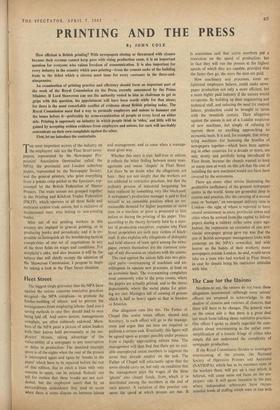Fleet Street
The biggest single grievance that the NPA have against the unions concerns restrictive practices designed—the NPA complains—to promote the feather-bedding of labour, and to prevent the managements from employing labour- (and cost-) saving methods in case they should lead to men being laid off. And union desires, managements complain, are often ruthlessly enforced. Mem- bers of the NPA paint a picture of union leaders with their knives held permanently at the em- ployers' throats, taking advantage of the vulnerability of a newspaper to any interruption or delay in production. The standard example given is of the nights when the roar of the presses is interrupted again and again by 'breaks in the paper' which have to be repaired before the rest of that edition, due to catch a train with only minutes to spare, can be printed. Nobody can tell for certain that these breaks are not acci- dental, but the employers assert that by an extraordinary coincidence they tend to occur when there is some dispute on between labour and management; and to cease when a manage- ment gives way.
Whether this story is true, half-true or untrue, it reflects the bitter feeling between many man- agements and union 'chapels' in Fleet Street. Let there be no doubt what the allegations are here : they are not simply that the workers are too addicted to restrictive practices, but that the ordinary process of industrial bargaining has been replaced by something very like blackmail. A newspaper's production manager is said to find himself in an untenable position when an un- reasonable demand for higher payments or more men on a machine or press is presented to him before or during the printing of his paper. This, according to the theory fervently held by a num- ber of production executives, explains why Fleet .Street proprietors are such easy victims of black- . mail. It also explains why allegations of disloyalty and total absence of team spirit among the news- paper owners themselves are the common coin- age of any discussion on relations with the unions.
The case against the unions falls into two prin- cipal parts—overmanning of machines and un- willingness to operate new processes, at least on an economic basis. The overmanning complaints most commonly refer to the press rooms, where the papers are actually printed, and to the stereo departments, where the metal plates for print- ing are cast. Managers tell of crewing of presses which is half as heavy again as that in Sweden or America.
One allegation runs like this. The Father of Chapel (the senior union officer, elected and honorary, in each office) will go to the manage- ment and argue that ten men are required to perform a certain task. Eventually, this figure will be agreed upon as proper, possibly under pressure from a rapidly approaching edition time. The management will then find that there are no suit- able unemployed union members to augment the seven they already employ on the task. The Father of Chapel will reluctantly agree that the seven should carry on, but only on condition that the management pays the wages of the three 'ghosts' into chapel funds, from which it is distributed among the members at the end of each quarter. A variation of this practice con- cerns the speed at which presses are run. It is sometimes said that union members put a restriction on the speed of production; but in fact they will run the presses at the highest speeds of which they are capable, provided that the faster they go, the more the men are paid.
New machinery and processes, some en- lightened employers believe, could make news- paper production not only a more efficient, but a more highly paid industry if the unions would co-operate. By building up their engineering and technical staff, and reducing the need for manual labour, production could be brought to terms with the twentieth century. Their allegation against the unions is not of a Luddite suspicion of new machines, but simply of refusing to operate them on anything approaching an economic basis. It is said, for example, that string- tying machines—for fastening the bundles of newspapers together—which have been operat- ing in other countries for a decade or more, are only slowly and painfully being introduced in Fleet Street, because the chapels, wanted to keep so many men at work on this job that the cost of installing the new machines would not have been covered by the economies.
There arc many other stories illustrating the productive inefficiency of the greatest newspaper centre in the world. Some are grounded deep in custom and practice, like the carrying of a second man, or 'humper,' on newspaper delivery vans in London—the sight of whom is reported to have caused amazement in many provincial towns and cities when he arrived from the capital to deliver papers during a railway strike some years ago. Indeed, the impression an executive of one pro- vincial newspaper group gave me was that the rest of British newspaper management looks with contempt on the NPA's cowardice, and with horror on the habits of their •workers; many newspapers outside London, he said, would never take on a man who had worked in Fleet Street, in case he should bring his restrictive attitudes with him.






































 Previous page
Previous page